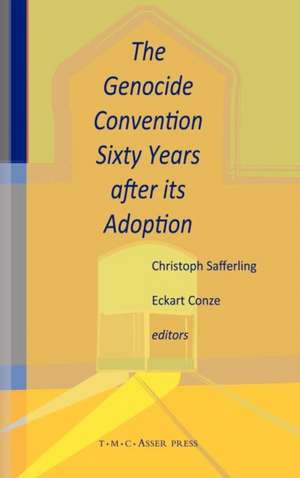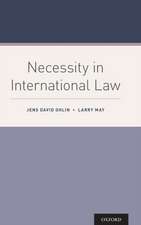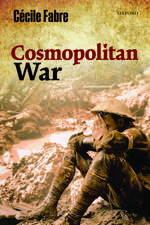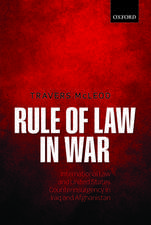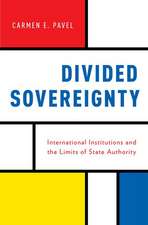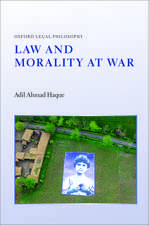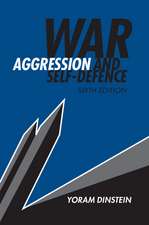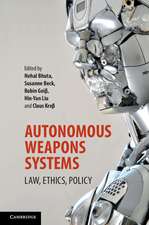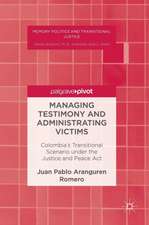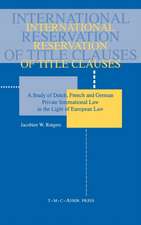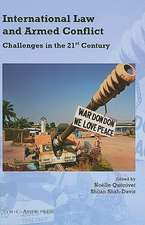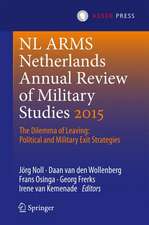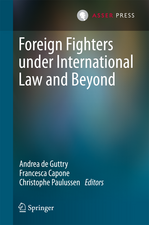The Genocide Convention Sixty Years after its Adoption
Editat de Christoph J. M. Safferling, Eckart-A. Conzeen Limba Engleză Hardback – 31 aug 2010
In 1948 the Convention on the Prevention and Punishment of the Crime of Genocide was adopted by the General Assembly of the United Nations. Thereby genocide was defined as an international crime.
Sixty years later, the prosecution of the crime of genocide raises a multitude of questions. Although genocide was not a crime during the Nuremberg Trial its historic roots rest with the persecution of Jews and other minorities by Nazi-Germany. Because of this historic focus the legal definition of genocide is difficult to apply to other conflicts.
Their contributions offer a range of insights on the practical problems and academic discussion surrounding the prosecution of genocide. And the combination of lawyers, historians and social scientists provides a broad assessment of the topic, from the origins of the Genocide Convention to its future implementation
No need to say that this book is an important contribution to the worldwide debate on and prosecution of genocide, making it valuable reading for academics and practitioners in international criminal law, historians, political scientists, students and all others interested in international law, the history of international law and international relations.
Christoph Safferling is Professor of Criminal and International Law at the Philipps-University of Marburg, Germany, and Director of the International Research and Documentation Center for War Crimes Trials (ICWC). Eckart Conze is Professor of Modern and Contemporary History at the University of Marburg and Deputy Director of the ICWC.
Preț: 649.87 lei
Preț vechi: 764.55 lei
-15% Nou
Puncte Express: 975
Preț estimativ în valută:
124.35€ • 130.16$ • 103.50£
124.35€ • 130.16$ • 103.50£
Carte tipărită la comandă
Livrare economică 31 martie-14 aprilie
Preluare comenzi: 021 569.72.76
Specificații
ISBN-13: 9789067043151
ISBN-10: 906704315X
Pagini: 340
Ilustrații: 400 p.
Greutate: 0.68 kg
Ediția:1st Edition.
Editura: T.M.C. Asser Press
Colecția T.M.C. Asser Press
Locul publicării:The Hague, Germany
ISBN-10: 906704315X
Pagini: 340
Ilustrații: 400 p.
Greutate: 0.68 kg
Ediția:1st Edition.
Editura: T.M.C. Asser Press
Colecția T.M.C. Asser Press
Locul publicării:The Hague, Germany
Public țintă
ResearchDescriere
In 1948 the Convention on the Prevention and Punishment of the Crime of Genocide was adopted by the General Assembly of the United Nations. Thereby genocide was defined as an international crime. Sixty years after its adoption, the prosecution of the crime of genocide still raises multiple questions. Although genocide was not a crime during the Nuremberg Trial its historic roots rest with the persecution of Jews and other minorities by Nazi-Germany. Because of this historic focus the legal definition of genocide is difficult to apply to other conflicts. Bringing together scholars and practitioners, this volume of essays examines the Genocide Convention from historic, legal and social science perspectives. Contemporary witnesses also report on their experiences of the Nuremberg, the Eichmann and the Auschwitz trials.
Cuprins
The Genocide Convention Sixty Years After Its Adoption.- The Genocide Convention Sixty Years After Its Adoption.- Historical Development.- Genocide in International Law and International Relations Prior to 1948.- Raphael Lemkin and ‘Genocide’ at Nuremberg, 1945-1946.- The United Nations and the Origins of the Genocide Convention 1946-1948.- Strategies For ‘Genocide Trials’ After World War Ii — How the Allied Powers Dealt With The Phenomenon Of Genocide In Occupied Germany.- The Holocaust and the Genocide Convention of 1948.- Public Policy Considerations.- Genocide Prevention and the Dynamics of Conflict.- War Crimes, Genocide Trials and Vergangenheitspolitik — the German Case.- Genocide and the Genocide Convention In Israel.- Interpretation of the Crime of Genocide.- The Policy Element in Genocide: When is it Required by International Rules?.- The two Notions of Genocide: Distinguishing Macro Phenomena and Individual Misconduct.- Different Forms of Participation in Genocide.- The Special Intent Requirement in the Crime Of Genocide.- PCase Studies.- The Challenges of Genocide Trials: ‘The Cambodian Situation’.- The International Criminal Court and the Crime of Genocide.- The Crime of Genocide Applied in Practice - Selected Aspects of the Jurisprudence of the AD HOC Tribunals’ Appeals Chambers.- International Genocide Trials: Three Case Studies.- Genocide and the International Court of Justice.- The IC J Judgment in the Bosnian Genocide Case and Beyond: A Need to Reconceptualise?.- Genocide and the International Court of Justice.- Historic Cases.- The Trial of Adolf Eichmann and Other Genocide Trials.- The Auschwitz Trial at the landgericht Frankfurt and its Importance for the Prohibition of Genocide.- The Nuremberg Trial 1945-1946.
Textul de pe ultima copertă
In 1948 the Convention on the Prevention and Punishment of the Crime of Genocide was adopted by the General Assembly of the United Nations. Thereby genocide was defined as an international crime.
Sixty years later, the prosecution of the crime of genocide raises a multitude of questions. Although genocide was not a crime during the Nuremberg Trial its historic roots rest with the persecution of Jews and other minorities by Nazi-Germany. Because of this historic focus the legal definition of genocide is difficult to apply to other conflicts.
Bringing together scholars and practitioners, this volume of essays examines the Genocide Convention from historic, legal and social science perspectives. Contemporary witnesses also report on their experiences of the Nuremberg, the Eichmann and the Auschwitz trials.
Their contributions offer a range of insights on the practical problems and academic discussion surrounding the prosecution of genocide. And the combination of lawyers, historians and social scientists provides a broad assessment of the topic, from the origins of the Genocide Convention to its future implementation
No need to say that this book is an important contribution to the worldwide debate on and prosecution of genocide, making it valuable reading for academics and practitioners in international criminal law, historians, political scientists, students and all others interested in international law, the history of international law and international relations.
Christoph Safferling is Professor of Criminal and International Law at the Philipps-University of Marburg, Germany, and Director of the International Research and Documentation Center for War Crimes Trials (ICWC). Eckart Conze is Professor of Modern and Contemporary History at the University of Marburg and Deputy Director of the ICWC.
